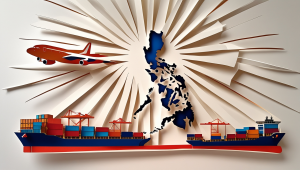Philippine Annual Inflation Slows to Near Five-Year Low in March
April 4, 2025
The subdued inflation figures are promising for both consumers and businesses alike, providing a potential boost to consumer spending amidst a global economy facing various challenges. Analysts believe this environment may offer the Bangko Sentral ng Pilipinas (BSP) the flexibility to pursue a more accommodative monetary policy. With the upcoming meeting on April 10, there is speculation that the central bank could implement a 25 basis points cut in interest rates, a move that would aim to stimulate economic activity and further encourage investment. The decline in inflation not only eases the financial burden on households but also presents opportunities for companies to strategize around lower operational costs, paving the way for a more robust economic recovery in the Philippines. READ MORE
Philippine Government's Gross Borrowings Reach P2.564 Trillion in 2024
April 4, 2025
The move to prioritize domestic borrowing highlights the government's confidence in its local financial markets and investors, which are becoming increasingly pivotal in funding national expenditures. This reliance not only supports the local economy but also strengthens investor sentiment, positioning the Philippines as a resilient player in the regional fiscal realm. Additionally, with global interest rates remaining uncertain, focusing on domestic instruments can potentially provide a more favorable borrowing cost. Analysts suggest that while this strategy may help manage short-term risks, it remains essential for the government to maintain fiscal discipline to ensure long-term economic stability and to address evolving challenges in the global financial environment. READ MORE
Security Bank Corp. Recognized for Fund Management Excellence
April 4, 2025
In an environment marked by fluctuating market conditions and evolving investor expectations, Security Bank's achievement highlights its strategic approach to fund management and asset allocation. Such recognition serves as a testament to the bank's robust investment processes, risk management practices, and its dedication to adhering to best practices in transparency and performance. As financial markets continue to evolve, firms recognized for their management capabilities stand out, providing investors not just with competent handling of funds but also with the assurance of long-term growth potential.
This award comes at a time when Philippine financial institutions are focusing on enhancing their fund management operations to remain competitive amidst increasing regulatory scrutiny and market volatility. Security Bank’s accomplishments position it favorably within the crowded banking sector, attracting both institutional and retail investors seeking reliable avenues for their assets. With a track record of strong performance, the bank is poised to leverage this recognition to strengthen its reputation in the market and drive further growth opportunities in the coming years. READ MORE
Philippine Exporters Seek Fiscal Reforms Amid Global Market Disruptions
April 4, 2025
Moreover, stakeholders in the export sector emphasize the urgent need for infrastructural improvements, particularly in the areas of port development and railway systems. Upgrading and modernizing transportation infrastructure can significantly reduce logistical costs and turnaround times, which are crucial factors in meeting international standards and responding to market demands. The Philippine economy has been grappling with supply chain challenges exacerbated by the pandemic, and enhancing logistical capabilities can provide exporters with a competitive edge. As the global economy continues to recover and adapt, these fiscal reforms and infrastructure investments could serve as a lifeline for the export industry, helping to mitigate the effects of external pressures and fostering long-term growth in the sector. READ MORE
Department of Energy and South Korean Institutions Launch Knowledge Sharing Program
April 4, 2025
The initiative comes at a crucial time as the Philippines seeks to diversify its energy sources and transition towards more sustainable alternatives amidst rising energy demands and climate change challenges. By tapping into South Korea's experience in successfully implementing efficient energy policies, the DOE hopes to formulate actionable strategies that can enhance energy accessibility, affordability, and security for Filipino consumers. This program not only promotes technology transfer but also encourages knowledge exchange and collaboration that can lead to innovative solutions tailored to the unique energy landscape of the Philippines. Increased cooperation with South Korean partners is expected to create business opportunities within the renewable energy sector, paving the way for investment and development projects that can significantly contribute to the nation’s economic growth and stability. READ MORE





